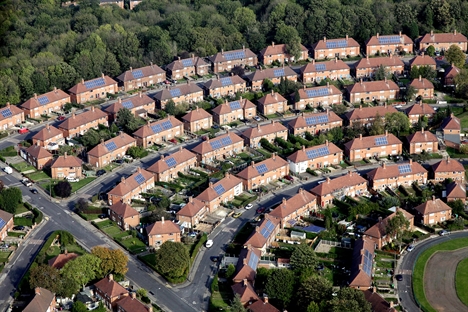04.11.16
Hitting 2020 climate change targets four years early
Source: PSE Oct/Nov 16
Nottingham City Council’s portfolio holder for energy and sustainability, Cllr Alan Clark, tells PSE how the local authority has surpassed its climate change targets four years ahead of schedule.
Recent central government statistics show that Nottingham has smashed its ambitious climate change targets four years early, putting it top of all the core cities with the greatest reduction in emissions and the lowest emissions per person.
The data shows a 33% reduction in carbon emissions since 2005, beating a target set by Nottingham City Council to reach a 26% reduction by 2020. We are now producing almost three tonnes less of CO2 per year per person than we were in 2005.
This is due to wide-ranging programmes by the public, private and voluntary sectors which have increased low-carbon energy generation, decreased energy usage and tackled fuel poverty.
Decreasing energy usage: domestic energy efficiency
A major part of this achievement was due to schemes to tackle Nottingham’s cold and energy inefficient homes, helping those in the worst fuel poverty whilst also making strides on the city’s carbon emissions.
A partnership between Nottingham City Council and Nottingham City Homes (NCH) has seen over 20,000 homes benefiting from energy-efficiency schemes. This used a fuel poverty index developed by NCH to prioritise neighbourhoods with the worst fuel poverty and the least efficient houses. Key achievements include:
- 4,000 social houses have solar panels generating free green electricity for the household, paid for by the council claiming the government FIT (Feed-in Tariff) scheme
- Over 5,000 social and privately-owned hard-to-treat homes have received Solid Wall Insulation schemes
- Thousands of council houses have received improvements such as boiler upgrades, double glazing, etc.
- Nottingham has received one of the largest pots of central funding for domestic energy-efficiency programmes in the country, taking advantage of funding such as Green Deal, Community Energy Saving Programme, Energy Companies Obligation and European Commission funding streams to drive our programmes forward
- Using third sector partner Nottingham Energy Partnership to target people who owned their own home with the same level of value obtained by the economies of scale achieved by NCH
- Continual expansions to our energy-from-waste district heating scheme turning the city’s rubbish into low-carbon heating and hot water for over 5,000 households

Decarbonising our operations
Whilst tackling climate change is gaining momentum on the local authority agenda, we are also faced with ever-decreasing budgets. Our Energy Services teams have been targeting high-demand areas across our estate and use a range of technical and behavioural solutions with the occupiers to drive down energy usage. As a council, we have shown that it is possible to support the green agenda while still offering viable services and/or bringing in income. Projects have included:
- First council in the UK to install solar canopies in our car parks: Two of our leisure centre car parks have had solar canopies installed, reducing carbon emissions and providing free, green electricity for the centres
- Conversion to LED lighting for heritage buildings: Wollaton Hall and Newstead Abbey have been among the UK’s first heritage buildings to take up LED lighting, being early adopters of new varieties that lend themselves to heritage aesthetics
- Energy-efficient lighting upgrades in public spaces, including more efficient systems for street lighting and car parks
- Streamlining the estate including consolidating head office functions into a single modern and more energy-efficient building
Green transport options
Nottingham is on a journey to become the UK’s greenest transport city, already seeing public transport use increase to the highest outside London. Substantial investment has been made into environmentally-friendly transport services, including trams, greener buses and cycling. The city’s green journey so far includes:
- Implementing the country’s only Workplace Parking Levy, which not only funds transport improvements but also encourages employers and employees to consider alternative travel options
- 2004 saw the launch of the Nottingham tram system and a major expansion to it opened in 2015
- Creating Europe’s largest electric bus fleet, that will soon also offer the only fully-electric Park and Ride service in the UK
- Encouraging more people to choose a healthy, clean travel option through the Citycard Cycle scheme, which has seen 90,000 free hires of a fleet of 500 bikes from hubs around the city in the last year alone. Also investing £10m in a cycle superhighway network across the city
- Developing the City Car Club which makes 12 cars, mainly hybrids and electric vehicles, available to hire for short journeys in the city – with over 280 members travelling more than 68,000 miles in the last year
- Creating a pedestrian-friendly city centre, with 90% of streets pedestrianised and a Clear Zone where vehicle movements are restricted
- Working towards implementing a Clean Air Zone in the city centre by 2020
- Nottingham City Council was the first authority in the UK to implement emission standards as part of its Statutory Partnership Scheme, which allows buses to only use the city stops if they have met the emission standards
- Nottingham has recently secured £6m funding to become one of the UK’s exemplar Go Ultra Low Cities, enabling us to implement a wide range of new initiatives to make electric vehicles and sustainable transport more accessible
Nottingham is proud of its achievements in smashing its climate change targets four years early and we’re not stopping there. We continue to install solar PV where it is commercially viable, we are working with the city’s two excellent universities to drive innovation in domestic and commercial energy usage, and the roll-out of the ULEV electric vehicles programme is just beginning. Watch this space!
Tell us what you think – have your say below or email [email protected]